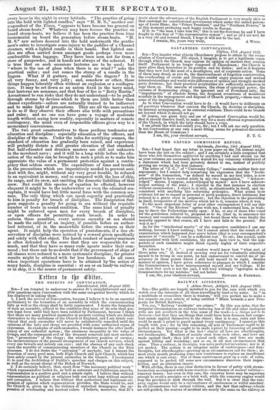GALVANIZED CONVOCATION.
C7ifton, 17th August 1852. Sin—You inquire what objects Churchmen propose to attain by the resus- citation of Convocation. The object, I imagine, is to get a legitimate organ through which the Church may express its opinion on matters that concern itself. Parliament is no longer composed of Churchmen ; the Church is more alive than heretofore to its position and its duties ; and so it happens that they now feel the need of a mouthpiece, and of corporate action, borne of them may dread, as you do, the disentombment of forgotten controversies, the overhauling of creeds and liturgies amidst angry passions and mutual misunderstandings and world-wide differences of opinion and strongly-marked party divisions; but their practical perplexities are sufficiently numerous to urge them on. The assaults of enemies, the abuse of episcopal power, the excesses of Romanizing clew, the ignorant zeal of Protestant laity, the "impedimenta" of obsolete forms, the frequent occurrence of monstrous scandals in the management and disposal of Church property,—these may be some of the impelling forces. As to what Convocation would have to do : it would have to deliberate on all guestione whatever that concern the Church, its doctrine or discipline, its internal arrangements, or its external relations. There could be no bounds set beyond which it should not go. Of course, one great duty end use of galvanized Convocation would be, that it should dissolve itself, to make way for a more effectual representation of the Church, in which the laity should have a voice. I am afraid this will not satisfy you, Sir but I will ask one only question. Is not Convocation at any rate a more fitting arena for polemical discussion than the Rouse of Commons ?
I am, Sir, your obedient servant, F. T. C.


























 Previous page
Previous page